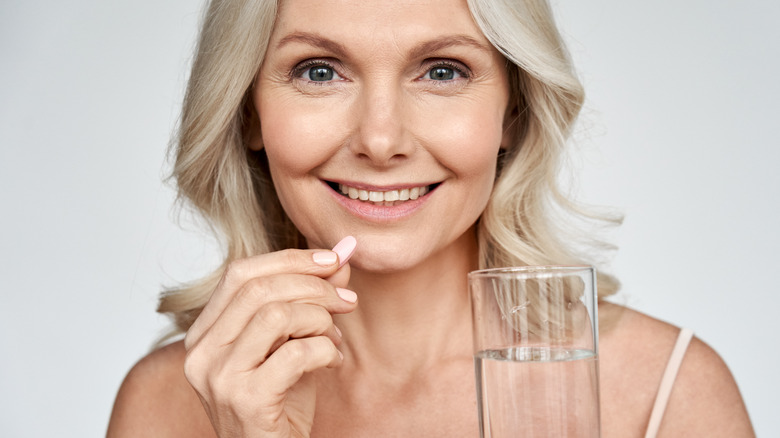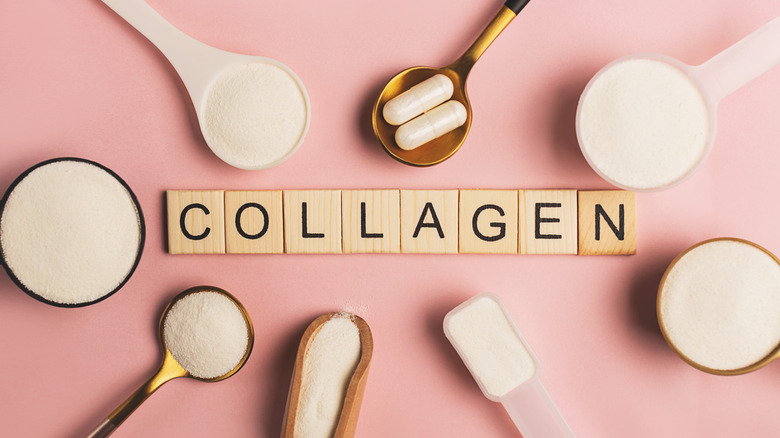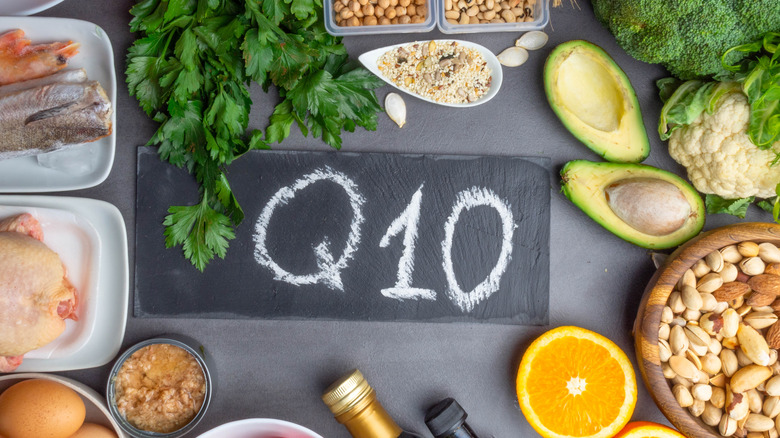The Truth About Anti-Aging Supplements
The search for the fountain of youth never ceases, and whether by way of natural remedies or cosmetic procedures, people are always on the hunt for the next best health supplement, wrinkle remover, or fine line filler. Many of us know by now that lifestyle choices can play a part in slowing the aging process, and experts share with the Washington Post that nutrition and exercise do play a crucial role in remaining youthful and healthy.
Aside from the obvious choices like hydration, a good night cream, and Botox, there are some supplements to keep in the cabinet that support a more youthful-looking appearance as well as a younger feeling body and mind. Some of these you may already keep in your arsenal and some you may never have heard of, but here, we break down the truth about some of the supplements that purportedly keep you looking and feeling young.
Collagen is naturally occurring but may be helpful as a supplement
According to the Journal of Drugs in Dermatology, collagen is a naturally occurring protein found in our bones, skin, and ligaments, making up about 75% of the skin's support structure. Director of cosmetic and clinical research in dermatology at Mount Sinai Hospital in New York City, Joshua Zeichner, MD, tells Everyday Health, "Think of collagen as the frame of your mattress; it gives [your skin] structure and support."
The less collagen we have, the more our skin can sag and wrinkle, as collagen provides the elasticity and firmness necessary for younger-looking skin. Unfortunately, board-certified dermatologist at Modern Dermatology in Westport, Connecticut, Deanne Robinson, MD, tells Everyday Health that "We lose collagen year after year, and make lower quality collagen." Dr. Robinson goes on to say that free radicals reduce the amount of collagen in the skin, and we often get exposed to these via environmental pollutants, foods, and UV rays.
According to Healthline, there have been some promising, although not concrete, studies that show supplementing with collagen can help improve elasticity, reduce wrinkles, and support hydration.
CoQ10 slows physical and mental aging
WebMD reports that CoQ10 is a powerful antioxidant that naturally occurs within the body and is essential for protecting against free radical damage, as well as for supporting energy production. Healthline shares that, with age, there is a possible decline in CoQ10 levels, and supplementation may be beneficial for both skin and organ health. A study published in the Journal of Nutrition, Health, and Aging found that over the span of four years of supplementing with CoQ10 (and selenium), older people reported improved quality of life, fewer hospital visits, and a slowed mental and physical deterioration. The supplement has also been used in patients with heart disease, diabetes, and migraines (via Mayo Clinic).
According to MindBodyGreen, CoQ10 is a must-have in the anti-aging battery of supplements as it is crucial for mitochondrial function, which helps the skin make collagen and keratin. As stated above, it's also an antioxidant that helps neutralize free radicals, which in turn helps reduce the risk of wrinkles and fine lines. One study published in the Biofactors Journal reports that supplementing with CoQ10 can even enhance skin's smoothness.
Curcumin and EGCG help support brain health
Healthline reports that curcumin is a powerhouse full of anti-aging properties. You may have heard of curcumin before, as it's the main component of the popular spice turmeric. As we age, our cells stop dividing, and Healthline states that this cellular non-event might "accelerate aging and disease progression."
Curcumin has been shown to help delay this process, in turn promoting longevity and supporting anti-aging — plus, turmeric intake has shown a decreased risk of mental deterioration (via Healthline). A study published in the Current Pharmaceutical Design states that curcumin is a "powerful antioxidant, anti-inflammatory agent" that has been shown to slow down the aging process.
Finally, Epigallocatechin gallate (EGCG), the compound found in green tea, is said to slow down the onset of disease and increase longevity (via Healthline). Like CoQ10, this compound supports the cells' mitochondrial function, which reduces the risk of accelerated aging. A study published in the Journal of Nutritional Biochemistry found that green tea properties, specifically Epigallocatechin-3-gallate, can support the brain during aging and possibly act as a defender against Parkinson's and Alzheimer's diseases.
A healthy lifestyle that includes balanced nutrition, exercise, and rest may help support anti-aging, and discussing aging concerns with your doctor is the best way to help choose the right supplements for you.



